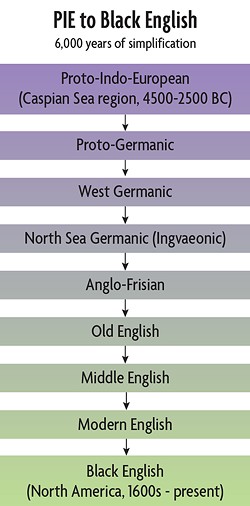[
{
"name": "Top Stories Video Pair",
"insertPoint": "7",
"component": "17087298",
"parentWrapperClass": "fdn-ads-inline-content-block",
"requiredCountToDisplay": "1"
}
]
"Black English ... is a kind of tune-up of the English language. Some of the needless complexities are wiped away, just as happened all along the journey from Proto-Indo-European to English."
— Linguist John McWhorter
Thanks to rap music, the internet, countless TV shows and movies, and just living in a mixed society, we're all familiar with Black English, which civil rights leader Jesse Jackson famously called "slang" and "garbage." The civil rights leader was railing against the 1996 decision by the Oakland City Council to incorporate the dialect spoken at home by most black kids into the classroom. (The city council called it "Ebonics," from ebony + phonics.)
Jackson was out of line — ain't nothin' wrong with Black English. Although it's sometimes derisively referred to as "bad English," it's not (as linguist Geoffrey Pullum put it) "standard English with mistakes." Black English (formally, African-American Vernacular English or AAVE) is a dialect of English no less complex, systematic and nuanced than that spoken by NPR newsreaders. In some ways, it's more expressive than Standard American English, SAE being "the variety of the English language that's generally used in professional communication in the United States and taught in American schools."
Black English has several grammatical features that distinguish it from SAE, including:
• Missing copulas: A copula is a useless bit of linguistic baggage in English that Black English has (sensibly) dropped: "How you doing?" instead of "How are you doing." The copula "are" isn't the usual use of the verb "to be," as in "My name is Barry," where "Barry" and "my name" refer to the same thing.
• Double negatives: "I ain't never seen such a sight." This is negative concord, emphasis by repetition. (Compare the less expressive, "I haven't ever seen such a sight!") It's used the world over (¡No necesito nada!); Chaucer and Shakespeare regularly used double, even triple, negatives. (In Love's Labour Lost, Holofernes says, "Via, goodman Dull! Thou hast spoken no word all this while." Dull responds: "Nor understand none neither, sir.")
• Uninflected verbs: "She write her memoir." "He work for the county." That is, there's no –s ending in the present tense, third person singular.
• Habitual aspect: "He be singing" means he sings regularly, as a hobby or profession, i.e. he's a singer.
And many more. So while Black English is often more expressive that SAE, it's generally simpler. That's because it originated in the 1600s as an exoteric language, one learned imperfectly by adults, as opposed to an esoteric native language learned from birth. The adults in this case were, of course, people abducted from Africa as slaves who learned their English from white overseers. Like any exoteric language, its grammar is simplified. (It's a myth, by the way, that Black English has its grammatical roots in the dozen or so West African languages spoken natively by slaves.)
But the language spoken by those slave owners — English of the 1600s and 1700s — was originally exoteric, too, as were its predecessors. Middle English, for instance, derived from Old English (with all its Proto-Germanic complexity) spoken in England following settlement by Angles, Saxons, Jutes and Frisians. The next wave of invaders, Scandinavian vikings, were mostly males who, marrying native women, learned — and simplified — the local language, passing this "Old-English-lite" (that is, Middle English) to their children. In the process, English lost most of its noun genders, verb conjugations and much else.
This process of language simplification goes back even further. Proto-Indo-European (PIE) was an unholy mess of grammar and syntax before Proto-Germanic simplified it. (In "Grimm's Law: The Phoenician Connection," Nov. 15, 2012, I discussed how Proto-Germanic probably originated as an exoteric language when Phoenician adults encountered PIE.) Each subsequent iteration lost some complexity, such as when Old English morphed into Middle English, as we saw above. In the broader context, then, the Black English dialect is carrying on a venerable tradition of simplifying: in this case, stripping SAE of some of its complex forms. A process surely to be continued, cuz you ain't seen nothin' yet.
Barry Evans ([email protected]) wants to learn jive. His newly-published fifth compendium of these columns, Curse of Field Notes, is at Eureka Books, Booklegger and Northtown Books.
Speaking of...
-

The Mystery of the Wiyot and Yurok Languages
Jun 9, 2022 -

Love I Language
Mar 10, 2022 -

Language: 100,000 or 1 Million Years Old?
Feb 24, 2022 - More »
Comments
Showing 1-1 of 1
more from the author
-
A Brief History of Dildos
- Apr 11, 2024
-
Eclipse!
- Mar 28, 2024
-
The Little Drone that Could
- Mar 14, 2024
- More »
Latest in Field Notes
Readers also liked…
-
Trouble on the Line: The Reality Part 2
- Nov 3, 2022

































